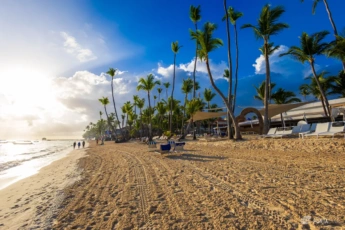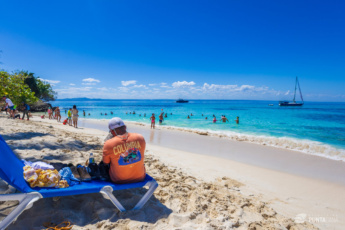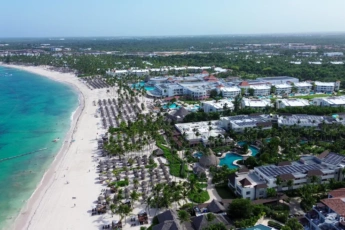Long Term Rentals in Punta Cana for Tenants and Property Owners – Pros & Cons and the Most Popular Regions
Long-term rental in Punta Cana is not only a cost-effective solution but also an opportunity to plunge into the unique atmosphere of this Caribbean corner of paradise for a long time. Punta Cana, with its sandy beaches, emerald sea and sunny days, attracts both tourists and those wishing to master this paradise for a longer period.
Let’s look at the key aspects of long-term rentals in Punta Cana. We will discuss the advantages of such a lease, the features of this region’s real estate market and advise both tenants and property owners. After all, long-term rental in Punta Cana is an opportunity to make dreams of living on the Caribbean coast a reality. Let’s dive into it together!
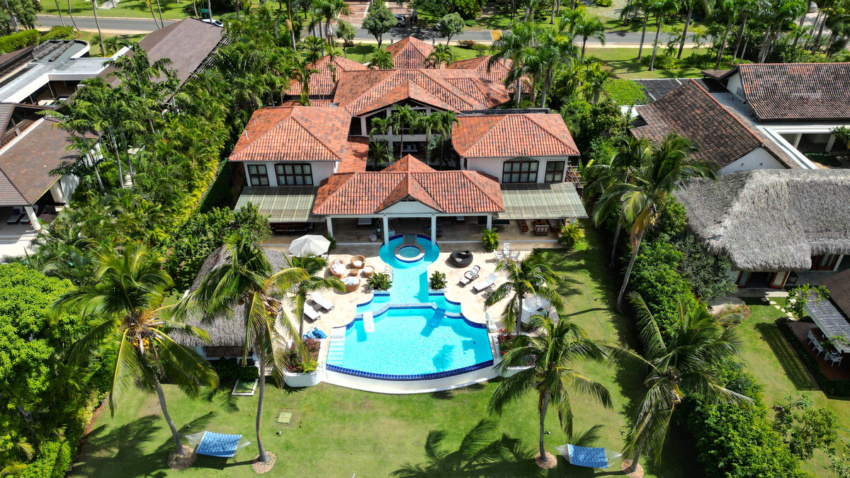
Villa in Cap Cana for a long-term
Key factors of the long-term rental market
in Punta Cana, the DR
With its white sand beaches, crystal clear seas, and tropical climate, Punta Cana has long earned a reputation as one of the most attractive tourist destinations in the Caribbean. In addition to its tourist attraction, Punta Cana also provides unique opportunities for long-term rental housing. Let’s look at the key aspects of the real estate market in this region.
- Punta Cana is undoubtedly a popular destination for long-term rentals among travelers who want to enjoy the region, and workers who temporarily live in this paradise come here. This diverse demand creates a stable rental market.
- The Punta Cana market offers a variety of long-term rental properties, including apartments, houses, cottages, condos, and villas. Each of them has its own unique features, allowing tenants to choose a property that suits their needs and budget.
- Several factors influence the real estate market in Punta Cana. These factors include global economic conditions, the region’s political stability, and seasonal fluctuations in demand associated with the tourist seasons.
- For investors, the long-term rental market in Punta Cana is of interest. Stable demand and the potential to build long-term rental portfolios make this an attractive location for real estate investment.
- An essential aspect of the market is legal and financial issues. Understanding local laws and tax obligations is essential when renting a property for the long term.
- Recent years have seen a steady increase in demand for long-term rentals in Punta Cana, making the area increasingly attractive to renters and investors.
With these factors in mind, Punta Cana’s real estate market represents a sustainable and scenic long-term rental opportunity that caters to the diverse needs of tenants and investors.
The most popular areas for long-term
rentals in Punta Cana
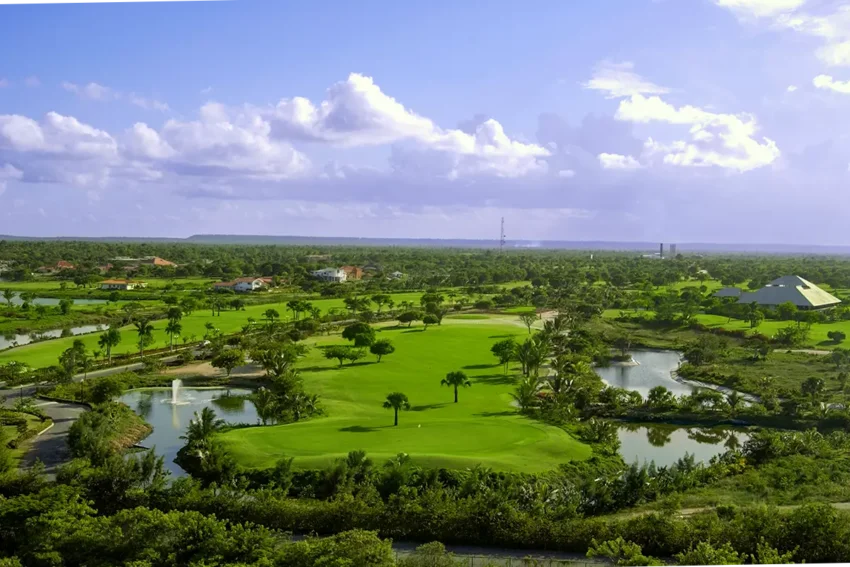
Cocotal Area in Bavaro, Punta Cana
Punta Cana offers a variety of regions for long-lease properties, and the popularity of these regions may vary depending on the needs of tenants. Here are some of the most popular areas for long-term rentals in Punta Cana:
Popular regions for long-term rent (with prices)
| Region | Average monthly rent | Description |
|---|---|---|
| Punta Cana Coastline (Near Beaches and Golf Courses) | $2,000 – $4,000 | This region offers the allure of proximity to Punta Cana’s stunning coastline, beautiful beaches, and world-class golf courses. It is ideal for those seeking natural beauty and recreational opportunities. |
| Bavaro (Popular Tourist Area) | $1,500 – $3,000 | Bavaro is the heart of Punta Cana’s bustling tourism scene, boasting pristine beaches and an array of dining and entertainment options. |
| Cap Cana (High-End Resort Area) | $3,000 – $6,000 | Cap Cana is an exclusive and luxurious resort area renowned for its upscale accommodations, luxury amenities, and picturesque surroundings. |
| Uvero Alto (Tranquil Coastal Area) | $1,200 – $2,500 | Uvero Alto offers a serene coastal experience, making it an ideal choice for those seeking a peaceful environment away from the hustle and bustle. |
| Los Corales (Beachside Community) | $1,800 – $3,500 | Los Corales is a charming beachside community celebrated for its beachfront access and convenience. |
| La Altagracia (Exclusive Area) | $4,000 – $7,000 | La Altagracia is an exclusive and high-end area known for its luxurious properties and upscale living. Long-term rentals in this prestigious neighborhood are high, catering to those seeking the pinnacle of luxury living. |
The choice of region depends on your preferences and budget. Each of these regions has its own unique advantages, and it is important to determine what is important to you when choosing a location for a long-term rental in Punta Cana.
Choosing suitable long-term accommodation
in Punta Cana
Punta Cana provides various long-term rental housing options to suit various guests’ preferences and budgets. From seafront apartments to secluded villas in the mountains, the choice of accommodation depends on individual needs and ideas. It is also essential to consider the location and infrastructure to ensure comfortable living.
Apartments for long-term
This type of property usually provides a convenience similar to a hotel but with more spacious living space and a kitchen. Apartments for the long term can be the perfect choice for solo travelers or couples looking to decrease costs. Many are on the coast, providing great ocean views and beach access.
-
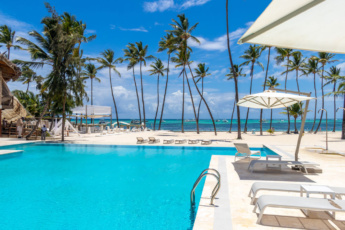
Quiet and Cozy Family Apartments for Rent – Directly on the Bavaro Beach, Punta Cana
from $199 / night View Details -
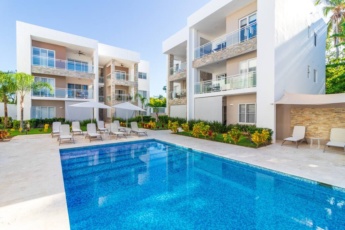
Modern 2BR Apartment in a New Secure Residence – Paseo del Mar, near Bávaro Beach, Punta Cana
from $119 / night View Details -
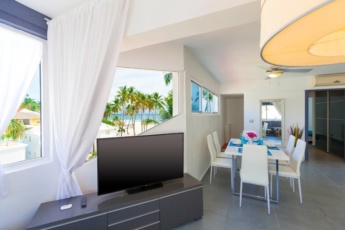
Private Ocean View Apartment for Rent in Punta Cana, the DR
from $135 / night View Details -
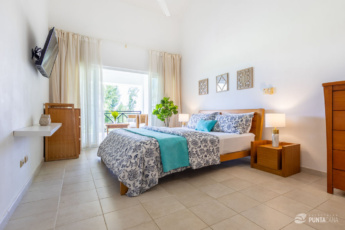
Secure & Private 2 BR Apartment for Rent in Cocotal, Punta Cana
from $95 / night View Details -
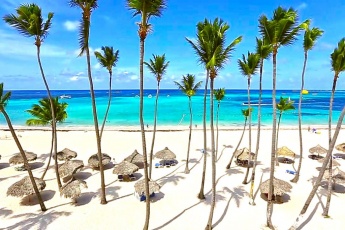
Unforgettable 3BR apartment for rent – on Los Corales Beach, DR
from $170 / night View Details -
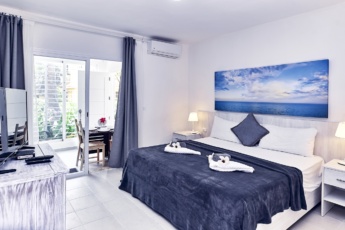
Safe and Secure Private Studio for Rent – Right on the Bavaro Beach
from $99 / night View Details
Villas for long-term rent
These types of real estate offer plenty of space and complete independence. Long-term villas in Punta Cana are perfect for families or groups of friends. They may include private pools and barbecue areas. Many are located in picturesque areas outside the city, providing privacy and tranquility.
-
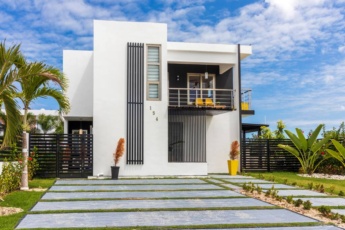
Modern & Stylish 4-BR Family-Friendly Villa Rental in a Quiet and Gated Community in Bávaro, Punta Cana
from $199 / night View Details -
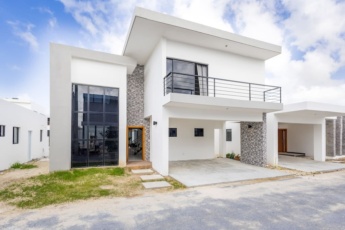
Brand New 3-BR Villa for Long-term Rental in Secure Community, Punta Cana
from $1600 / month View Details -
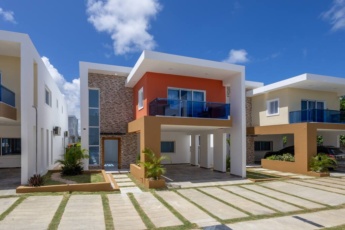
Modern and New Family Villa for Rent in Bavaro, Punta Cana – Quiet Gated Community
from $199 / night View Details
Complexes and condos for families
Typically, complexes have swimming pools, gyms, and 24-hour security. They are perfect for both families and single tenants. The most attractive and popular condos for families are everywhere: in different parts of Punta Cana, including the city center and outskirts.
-
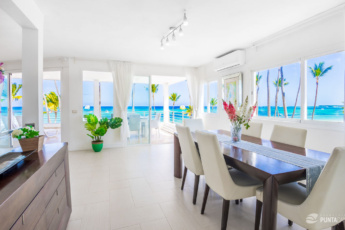
Beachfront Punta Cana Condo for Rent – Private Apartment with Stunning Oceanview, Bávaro, Los Corales
from $325 / night View Details -
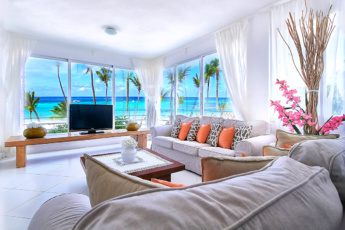
Dream Apartments for Rent in Punta Cana – Oreuga Ocean View Paradise
from $299 / night View Details -

Quiet and Cozy Family Apartments for Rent – Directly on the Bavaro Beach, Punta Cana
from $199 / night View Details -

Modern 2BR Apartment in a New Secure Residence – Paseo del Mar, near Bávaro Beach, Punta Cana
from $119 / night View Details -
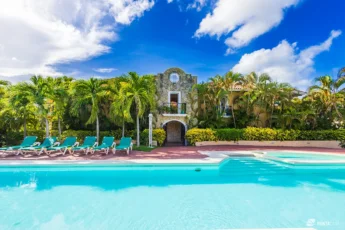
Amazing Lakeview 4BR Apartment in Secure Cocotal Community, Punta Cana
from $149 / night View Details -
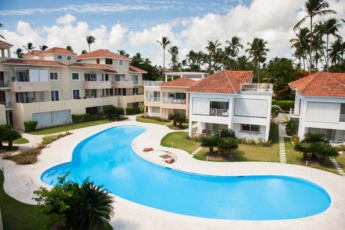
Deluxe E2, 2 BR, Sea View, Pool, Roof Terrace
from $259 / night View Details
Tips for choosing a long-term accommodation
- If you prefer a beach holiday, the accommodation on the coast may be the most suitable. Here you will enjoy direct access to beaches, restaurants, and water activities.
- The central parts of the city offer a wide range of restaurants, shops, and entertainment. This can be a convenient option for those who want to be closer to city life.
- Secluded areas in the suburbs can provide tranquility and closeness to nature. They are ideal for those seeking privacy and quiet holidays.
When choosing long-term accommodation in Punta Cana, it is important to consider your preferences and needs and evaluate the location and proximity to the infrastructure that is important for your comfortable stay. There is an ideal solution for every tenant in this variety of housing options.
Important things to know about long term
rentals in Punta Cana
It involves several legal and practical aspects that are important to consider when entering into rental transactions. Below is an overview of the key features of such a lease:
1. Legal aspects of real estate rental in the Dominican Republic
- Punta Cana homeowners can be local and foreign citizens. Before renting, you should ensure the property owner has the right to rent it out.
- Long-term rental rules and laws may vary by country and region. It is important to familiarize yourself with local rental laws to understand your rights and obligations as a tenant.
- Establishing the amount of rent and the timing of its payment is one of the key aspects of the lease. In Punta Cana, rents often include water, electricity, and internet costs, but details may vary.
Law 4314 of October 29, 1955, modified by Law 17-88 on February 5, 1988, is the Law that regulates everything related to rentals in the Dominican Republic. In addition, the country has a Rent Control department, where conflicts over evictions and housing price increases between owners and tenants are known (decree 4807 of May 1959).
2. Typical conditions and requirements in long leases
- Long-term leases in Punta Cana are typically for 6 months or more. The duration of the lease is specified in the contract.
- Owners may require a security deposit, usually one or more monthly rental payments. The deposit is returned to the tenant at the end of the rental period if there are no damages or arrears in payments.
- Leases usually specify who is responsible for maintaining and repairing the property. The responsibilities of the tenant and the owner may differ.
- The agreement may contain rules for using the property, such as pets, no smoking, and other restrictions.
3. Property maintenance and management issues during the rental period
- Depending on the contract, the owner may provide maintenance and upkeep of the property, including regular cleaning and repairs.
- Tenants are usually responsible for utility bills such as electricity and water. These costs may be included in the rent or paid separately.
- The agreement may contain provisions for resolving disputes between the tenant and the owner, including the possibility of recourse to local courts or arbitration.
Enter into long-term leases in Punta Cana with a full understanding of all conditions and in compliance with local laws and regulations. Careful reading of the contract and discussing all aspects with the owner or real estate agent will help avoid misunderstandings and ensure a comfortable stay for a long time.
Benefits of long-term rentals in
Punta Cana for tenants
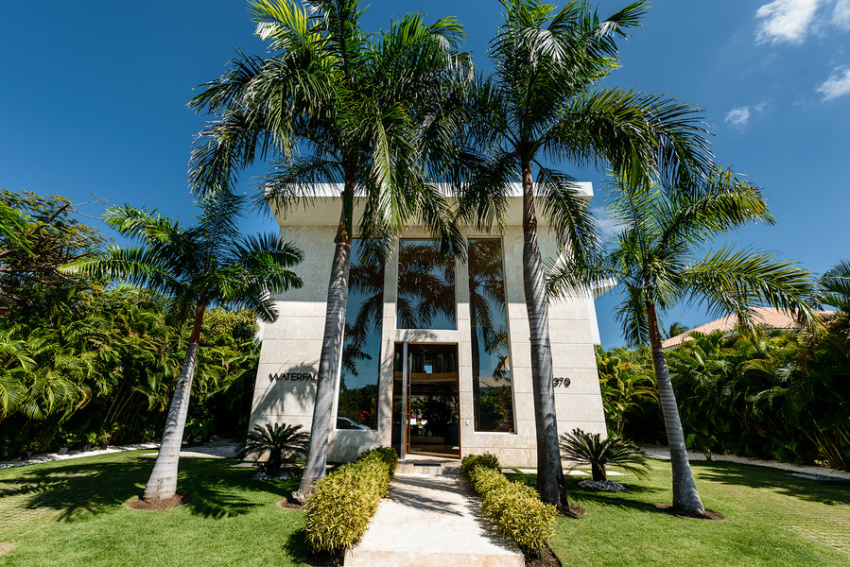
Luxury Villa Waterfall in Bavaro, Punta Cana
Long-term rentals in Punta Cana offer tenants a range of economic and practical advantages. This choice often turns out to be more profitable than short-term rentals or hotel stays. Let’s take a look at the key benefits of long-term rentals in this Caribbean paradise:
1. Cost savings prices for rent
- Long-term rentals often provide tenants with a lower cost of living on a long-term basis compared to short-term alternatives such as hotel accommodation. Monthly rental payments are usually lower than the cost of a hotel room.
- Renting a property with a fully equipped kitchen saves on restaurant visits, as you can cook your own food by choosing from local shops.
- Some local taxes and fees may be reduced on long-term rentals as they are seen as a more stable source of income for local authorities.
2. Creating a stable home environment
- Long-term rental allows you to create a stable living space where you can feel at home. You can personalize the interior, have your own furniture, and feel cozy and comfortable.
- Unlike standard hotel rooms, long-term rentals provide more spacious accommodation with separate bedrooms, a living room, a kitchen, and sometimes even a private pool.
3. Attractiveness for families and long-term workers
- Long-term rentals are beautiful to families as they provide stable housing and more space for children.
- For people working in Punta Cana temporarily, long-term rentals can be more cost-effective and comfortable than hotel accommodation, providing stability and security in a home for the duration of the job.
4. Convenience and freedom of choice
- Flexible Hours: Long-term rentals provide tenants with flexible living arrangements, typically for several months or years. This makes it possible to enjoy Punta Cana exclusively on your schedule.
- Freedom of Choice: Tenants can choose the type of housing, its location, and other parameters, which allows you to adjust the rental to your needs and preferences.
Long-term rental property in Punta Cana is a great opportunity to combine savings with comfort and freedom of choice. This option opens the door to the unique world of the Caribbean for tenants, allowing them to enjoy all the delights of Punta Cana for a long time.
Pros of Punta Cana long-term rentals
for property owners
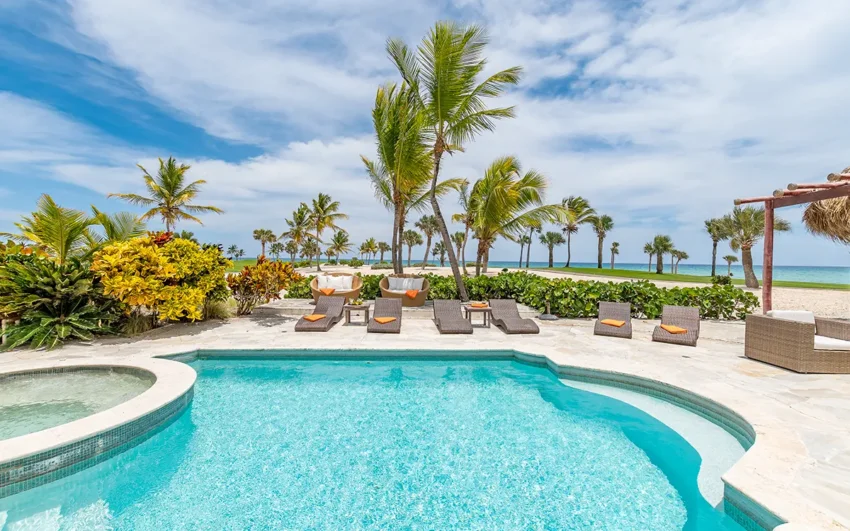
Luxury ocean view villa in Cap Cana
Long-term rentals in Punta Cana, a popular tourist destination in the Dominican Republic, offer several advantages for property owners to invest in the area. Here are some of the key advantages:
1. Stable income generation
A clear advantage of a long-term contract is that rental income is fixed and more predictable. Knowing how much cash comes in each month makes it easier to project a budget to establish a regular maintenance routine and forecast income for the owner.
2. Ease of getting financing
The possibility of having a budget projection and an income forecast for the long-term rentals of the property makes it easier to obtain financing. Investors or homeowners may receive better interest rates and financing terms if the lender believes the investment has fewer potential risks.
3. Lower operating expenses
On the other hand, operating expenses are lower for an apartment or house that will be put up for long-term rental. Tenants on this type of lease are responsible for cleaning, furnishing, and basic items, yard maintenance, and utility payments.
4. Less administrative tasks
Administrative tasks are less in long-term rentals of a property. These tasks are typically marketing a property, negotiating and signing a new rental agreement, and preparing the property. Tenants of houses or single-family homes usually renew their rental agreements periodically.
The administration fee is less if you hire a company to manage your long-term rentals. The rates to professionally manage a long-term rental property usually vary between 10 and 20% of the rental value per month; this value can reach 30% in the case of short-term rentals, for the most part. Several administrative and operational tasks are involved.
Cons of a long property lease in Punta Cana
for property owners
While long-term rentals here and in other destinations offer numerous advantages, they also come with some potential disadvantages before committing to such an arrangement. Here are some of the disadvantages of long-term rentals:
1. Lower profitability of the property
Generally, a well-managed short-term rental property can generate double or triple the annual return of a long-term rental property.
A long-term contract can mean it is difficult to increase rental prices. That means the revenue stream remains limited by the price set in the contract.
2. Challenges in preventive maintenance
Preventative property maintenance can become more complex. Detecting and repairing minor problems is made difficult by not being able to check ownership regularly. This means maintenance costs can increase if the problems worsen over time. In this case, the owner can perform quarterly or semi-annual inspections with prior notice.
3. Difficulty to rent again once unrented
Once the property is rented, sometimes it can take 1 or several months to find the right new tenant, these are months when you stop receiving income, but expenses continue to be paid.
4. Issues in eviction in case of problems
With a long-term rental, it is more difficult to evict a tenant who does not take proper care of the property or is frequently late with payments. Therefore, the risk of keeping a conflicting tenant is higher.
Prospects for the development of the long-term
rental market in Punta Cana
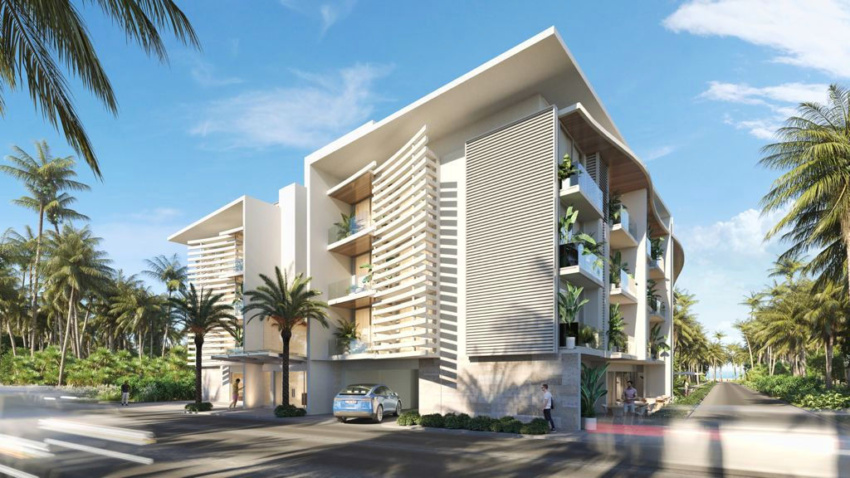
Caracoles Beach Suites – Pre-Construction, Punta Cana
Growth trends in demand for lasting accommodation in the region
- Punta Cana continues to attract both tourists and expats. This creates a stable demand for long-term housing. Tourists can stay for long periods to enjoy the warm climate and beautiful beaches, while expats and investors can look for opportunities in the region.
- With the growing popularity of remote work, many people look for places to work and relax comfortably. Punta Cana provides suitable infrastructure and natural beauty for those who wish to combine work and leisure.
- The Dominican Republic, including Punta Cana, is becoming an increasingly popular destination for international retirees. These people may prefer to rent a home for the long term instead of buying a property.
- Investors can see the potential in long-term rental housing as it provides a stable income. This may contribute to an increase in the supply of housing for rent.
Possible changes in the legislation and regulation of the real estate market
- With an increase in the number of tenants and investors in the rental housing market, stricter rules and regulations may be introduced. This may include requirements for the safety and quality of housing.
- Legislation could be improved to protect tenants’ rights, including clearer security deposit refund policies and regular home inspections.
- With the growing interest in sustainability and green lifestyles, there may be new requirements for the eco-efficiency of real estate.
- Changes in tax policy may affect the financial aspects of renting a home for both owners and tenants.
- The authorities can introduce programs and incentives to attract investors to the long-term rental market, increasing supply and improving tenants’ conditions.
The overall outlook for the long-term rental market in Punta Cana remains positive, given the strong demand and potential for improved legislation and regulation in this area. It is crucial to keep abreast of changes in laws and regulations to keep abreast of the latest news in the rental property market in this region.
As a conclusion
Long-term rentals in Punta Cana represent an attractive alternative for diverse people. This market continues to grow thanks to stable demand from tourists, expats, and investors. Long-term rentals allow you to enjoy a unique living experience in this paradise region, providing stable and comfortable accommodation.
Frequently asked questions about
long-term rental in Punta Cana
1. How much is rent per month in the Dominican Republic?
Rental prices in the Dominican Republic can vary significantly depending on the location, type of property, and luxury or amenities. Below is a rough estimate of monthly rental prices for different properties in different areas of the country. Keep in mind that these are approximate averages, and actual prices may vary:
Monthly rent estimates in the DR
| Property Type | Studio/1-Bedroom | 2-Bedroom | 3-Bedroom | 4-Bedroom+ |
|---|---|---|---|---|
| Santo Domingo | $400 – $800 | $600 – $1,200 | $900 – $1,800 | $1,200+ |
| Punta Cana | $600 – $1,000 | $900 – $1,500 | $1,200 – $2,500 | $2,500+ |
| Puerto Plata | $300 – $600 | $500 – $900 | $800 – $1,500 | $1,200+ |
| Santiago | $300 – $600 | $500 – $900 | $800 – $1,500 | $1,200+ |
These prices are rough estimates and can vary based on the property’s location, size, condition, and whether it is furnished or unfurnished. Additionally, rental prices in popular tourist areas like Punta Cana may be higher during peak tourist seasons.
2. How much does it cost to live in Punta Cana?
The cost of living in Punta Cana, like in any other destination, can vary widely depending on your lifestyle, housing preferences, and spending habits. Punta Cana is known for its luxury resorts, but there are options for various budget levels. Here’s an approximate breakdown of living expenses in Punta Cana:
-
Housing:
Rent for a one-bedroom apartment: $600 – $1,000+ per month
Rent for a three-bedroom apartment or house: $1,200 – $2,500+ per month
Luxury villas can cost significantly more. -
Utilities:
Basic utilities (including electricity, water, heating, cooling): $50 – $150 per month
-
Groceries:
A typical grocery bill for a single person: $150 – $300 per month
Costs can be higher if you prefer imported or specialty items. -
Dining out:
Dining at inexpensive local restaurants: $5 – $15 per meal
Dining at mid-range restaurants: $20 – $50 per meal
Fine dining or upscale restaurants can be more expensive. -
Transportation:
Public transportation (buses and taxis) is relatively affordable.
Gasoline prices are higher due to import taxes. -
Entertainment:
Costs can vary widely depending on your activities.
Excursions, water sports, and tours can be additional expenses. -
Healthcare:
Health insurance costs can vary based on your coverage and provider.
Medical services in private clinics may be more expensive than public healthcare. -
Miscellaneous:
This includes personal expenses, such as clothing, personal care, and entertainment, which can vary greatly based on individual preferences.
These are rough estimates, and costs can fluctuate over time due to individual choices. Living in tourist destinations like Punta Cana can be more expensive than in other parts of the Dominican Republic due to the higher demand for goods and services catering to tourists.
3. How much does an apartment cost in Punta Cana?
The cost of an apartment in Punta Cana can vary widely depending on several factors, including the location, size, type, and amenities of the apartment. Additionally, whether the apartment is for sale or rent will also influence the price. Here’s a rough estimate of apartment prices in Punta Cana:
Renting an apartment:
- One-bedroom apartment: $600 – $1,000+ per month
- Two-bedroom apartment: $900 – $1,500+ per month
- Luxury apartments and those in upscale complexes can command higher rental prices.
Buying an Apartment:
- Prices for purchasing apartments in Punta Cana can vary significantly. It’s common to find apartments for sale in a wide price range.
- You might find one-bedroom apartments for sale at $100,000, but the price can go much higher for larger apartments or those in upscale developments.
- Luxury beachfront apartments in exclusive resorts or gated communities can range from several hundred thousand dollars to several million dollars.
Real estate prices can fluctuate, and working with a local real estate agent who can provide you with the most up-to-date listings and prices based on your specific criteria is essential. Additionally, prices can vary based on the proximity to the beach, the complex’s amenities, and the apartment’s overall condition.
4. Is Punta Cana a good place to live?
Whether Punta Cana is a good place to live depends on your personal preferences, lifestyle, and priorities. Punta Cana is primarily known as a tourist destination with beautiful beaches, luxury resorts, and a vibrant tourism industry. Here are some factors to consider when evaluating whether Punta Cana is a suitable place for you to live:
Pros and cons of living in Punta Cana
| Pros | Cons |
|---|---|
| Scenic beauty | Cost of living can be relatively high |
| Tropical climate | Limited infrastructure in some areas |
| Tourism and entertainment options | Isolation from other parts of the country |
| Growing expatriate community | Economic dependence on tourism |
| Job opportunities in the tourism industry | Language barrier for non-spanish speakers |
Ultimately, whether Punta Cana is a good place to live depends on your lifestyle and what you prioritize in your living environment. It’s essential to conduct thorough research, visit the area, and consider your specific needs and preferences before making a decision to relocate to Punta Cana or any other location.
5. Can I stay in the Dominican Republic for 3 months?
Many travelers can stay in the Dominican Republic for up to 3 months without a visa. The DR offers a tourist visa waiver for citizens of many countries, allowing them to enter the country for tourism purposes for up to 90 days.
Visa requirements and entry rules can change, so it’s essential to check with the nearest Dominican Republic embassy or consulate or visit the official website of the Dominican Republic’s migration authorities for the most up-to-date information and to ensure that your specific nationality and circumstances allow for a 3-month stay without a visa.
If you plan to stay in the DR for an extended period beyond the initial 90 days, you may need to leave the country and then return to reset your tourist visa or consider other visa options, such as a temporary residence visa, depending on your circumstances. Always check the latest immigration regulations and requirements before planning your trip.
6. Where is the cheapest place to live in the DR?
The price of housing in the Dominican Republic can vary greatly depending on the region, the type of accommodation, and the level of comfort you seek. Here are some regions where you can find less expensive housing:
- Azua is located in the southwest of the Dominican Republic and may have more affordable housing prices than touristy areas.
- Peravia is located in the southeast of the country and can also be a less expensive option for accommodation.
- Outside of the popular tourist towns like Punta Cana and Puerto Plata, you can find less expensive accommodation options. Consider opportunities in lesser-known cities and regions.
- If you plan a long-term stay in the Dominican Republic, consider renting instead of buying. This can reduce costs at the initial stage.
- The southern part of the Dominican Republic can be less expensive than the northern part and tourist regions.
Regardless of where you decide to live, it’s essential to research all the details about housing prices, terms of renting or buying, and housing quality. It is best to approach this issue with an understanding of your financial capabilities and needs for comfortable housing.
7. Is buying a condo in Punta Cana a good investment?
Buying an apartment in Punta Cana can be a good investment, but it depends on several factors to consider:
- Before buying an apartment in Punta Cana, do your market research. Consider the demand for real estate in this region, price dynamics, and forecasts. Understand what factors affect the real estate market here, such as the tourist season, changes in legislation, and economic conditions.
- Compare real estate prices in Punta Cana with price trends over the past few years. Remember that real estate prices can fluctuate and are not always a guarantee of rapid value growth.
- If you plan to rent an apartment, ensure there is a demand for such a property in the tourism sector. Consider the rental income and the costs of managing and maintaining the apartment.
- Location plays an essential role in the value and attractiveness of real estate. Consider proximity to the beach, transportation, restaurants, and other tourist attractions.
- Familiarize yourself with local laws and regulations for real estate ownership and foreign investors.
- Consider how you plan to finance the purchase of an apartment. Deciding whether to use your funds or obtain a mortgage can affect your financial responsibilities and risks.
We advise thoroughly analyzing investment opportunities and risks before purchasing an apartment in Punta Cana. Consulting with local real estate professionals and financial advisors may also be helpful.
8. Is it smart to invest in Punta Cana?
The decision to invest in any location, including Punta Cana, should be based on a thorough analysis and understanding of the risk factors and opportunities. There may be various investment opportunities here, but several factors should be considered:
- The main branch of Punta Cana’s economy is tourism. If you are considering investing in this region, it may be related to hotels, restaurants, transportation for tourists, rental properties for resorts, etc. Demand for such services may increase or decrease depending on economic conditions and events.
- As with other tourist regions, Punta Cana is subject to risks related to seasonality, weather conditions, economic fluctuations, and changes in political conditions. There may also be specific risks for investors who plan to buy real estate, such as changes in legislation regarding foreign property owners.
- Before investing in any region, it is essential to conduct in-depth market research. Assess the supply and demand for your services or products and the competition. Analyze potential return on investment, payback period, and possible profitability.
- Ensure you understand all the rules and restrictions related to investing in the Dominican Republic. Information about taxes, property, and registration rules can affect your investment decisions.
- Explore the various investment opportunities in Punta Cana. For example, an investment in a hotel may have different risks and requirements than an investment in a restaurant or rental property.
Investing in Punta Cana should be justified and well thought out. It is recommended to contact financial and real estate professionals who can provide advice and help in developing an investment strategy.
Updated on: . Author:

